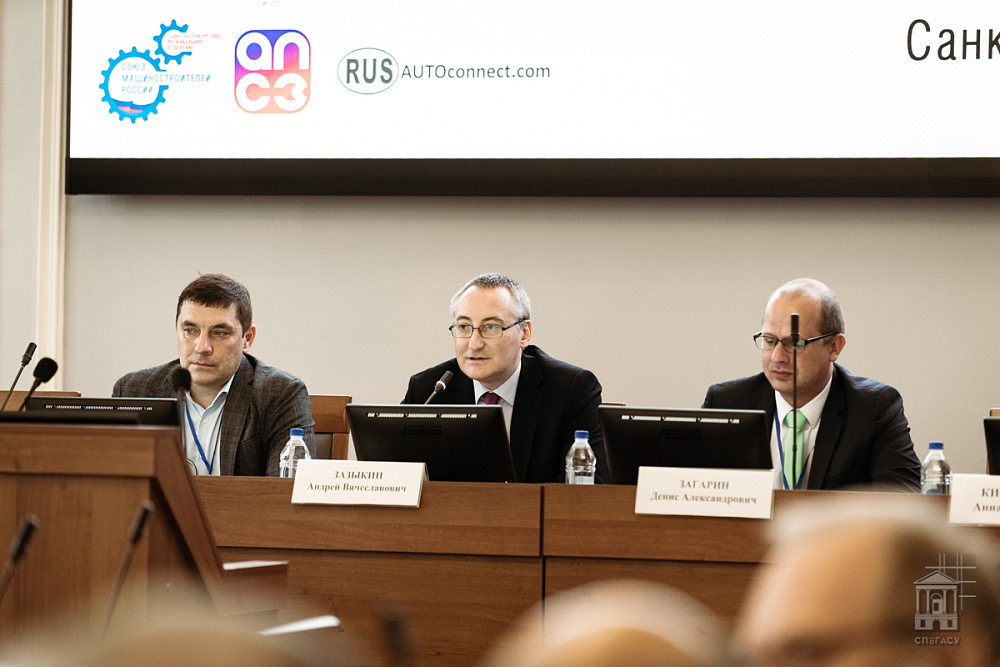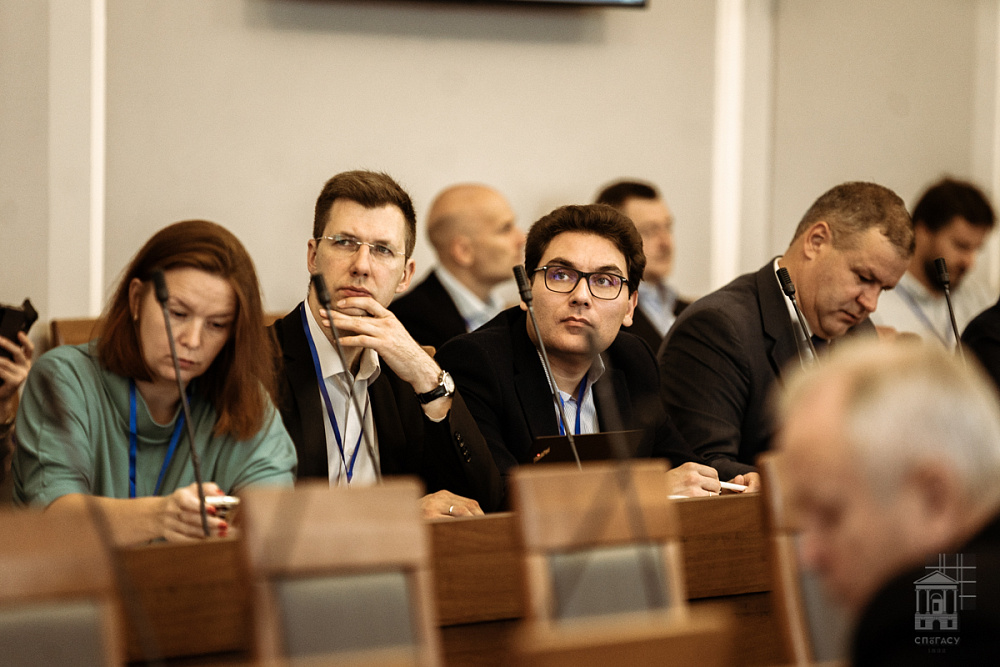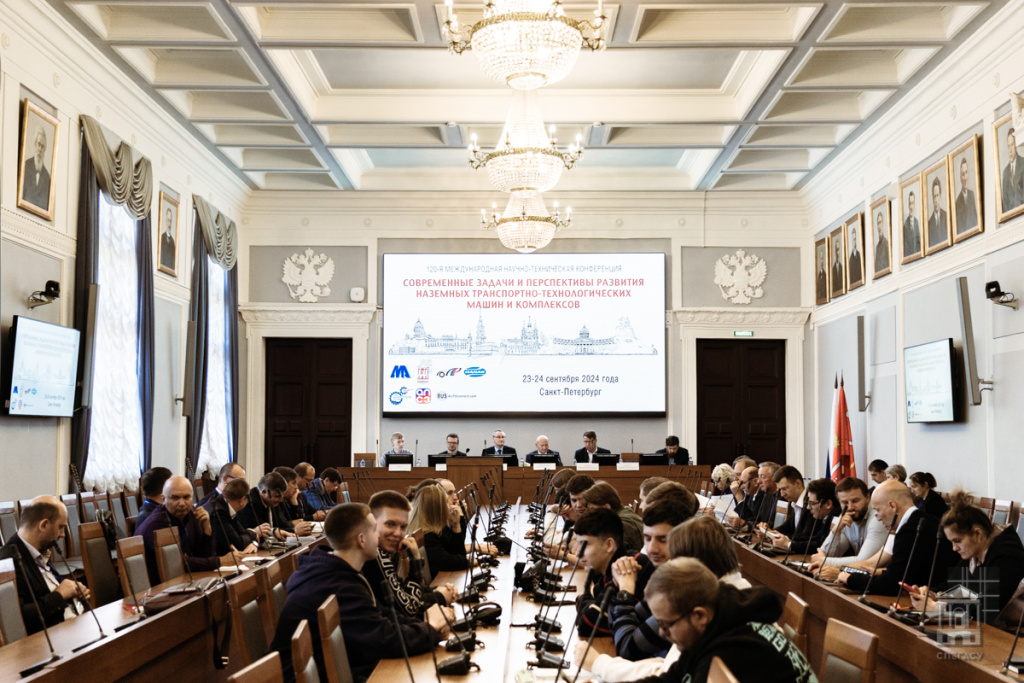 Section "Alternative Energy in Automobile Transport". In the presidium, from left to right: Evgeny Ruppel, head of the educational laboratory, SPbGASU PhD student; Anton Ulichev, general director of Orange Drive Engineering LLC; Andrey Zazykin, dean of the SPbGASU Faculty of Automobile and Road Building; Sergey Maevsky, advisor to the general director of St Petersburg State Unitary Enterprise "Passazhiravtotrans"; Filipp Dyakov, associate professor at the MADI Department of Automobiles, MADI; Sergey Vorobyov, associate professor at the SPbGASU Department of Transport Maintenance
Section "Alternative Energy in Automobile Transport". In the presidium, from left to right: Evgeny Ruppel, head of the educational laboratory, SPbGASU PhD student; Anton Ulichev, general director of Orange Drive Engineering LLC; Andrey Zazykin, dean of the SPbGASU Faculty of Automobile and Road Building; Sergey Maevsky, advisor to the general director of St Petersburg State Unitary Enterprise "Passazhiravtotrans"; Filipp Dyakov, associate professor at the MADI Department of Automobiles, MADI; Sergey Vorobyov, associate professor at the SPbGASU Department of Transport Maintenance On 23–24 September, SPbGASU hosted the 120th International scientific and technical conference “Modern challenges and prospects for the development of land transport and technological machines and complexes”.
The conference was organized by the Association of Automotive Engineers (AAE) together with SPbGASU with the support of the Association of Russian Automobile Manufacturers (OAR), the National Association of Automotive Component Suppliers (NAPAK), the St Petersburg regional branch of the Union of Mechanical Engineers of Russia, the Industrial Cluster "Union "Avtoprom North-West"" and the Supplier Platform "Rusavtoconnect".
The conference was attended by about one hundred scientists and representatives of the automotive industry, including those from AVTOVAZ, KAMAZ, and UAZ, who participated as listeners and speakers. Also present were manufacturers of automotive components and representatives of testing laboratories (MGC GROUP, Peterform, Centromash, RD Group, etc.). Educational institutions were represented by participants from SPbGASU, Moscow Automobile and Road Institute, Stieglitz St Petersburg State Academy of Art and Industry, St Petersburg Mining University, and Bauman Moscow State Technical University.
Modern technologies
At the section "Alternative energy in automobile transport", Sergey Maevsky, Advisor to the General Director of St Petersburg State Unitary Enterprise "Passazhiravtotrans", shared his experience and plans for decarbonization of the transport complex. He informed that in 2025 the Volgabus hydrogen fuel bus will be presented, and in 2026, the launch of the second stage of the Rzhevka electric bus fleet is planned. The company implements all its innovations in accordance with the Transport Strategy of the Russian Federation for the period up to 2030 with a forecast for the period up to 2035. This strategy provides for the implementation of long-term goals for the development of the transport system, including low-carbon transformation and digitalization of the industry in both freight and passenger transportation.
.jpg) Section "Alternative Energy in Automobile Transport". Philipp Dyakov, Associate Professor at the MADI Department of Automobiles
Section "Alternative Energy in Automobile Transport". Philipp Dyakov, Associate Professor at the MADI Department of Automobiles Philipp Dyakov, associate professor at the MADI Department of Automobiles, spoke about the peculiarities of operating electric vehicles. According to the speaker, traveling by electric vehicle will be more cost-effective than traveling by vehicle with an internal combustion engine, only if you do not use DC charging stations and do not travel to other cities. The ideal electric vehicle user lives in the suburbs, charges from their own outlet, and travels around the city. The ratio of the cost of charging and refueling in winter and summer does not change significantly, but the charging time changes significantly. The researcher shared advice with those who decided to travel to another city by electric vehicle, and warned that such a trip will take one and a half to two times longer than a trip by vehicle with an internal combustion engine.
The young science
The first day of the conference also included a round table of the student scientific society, where young scientists shared their ideas and research results. Fedor Belyakov, a software engineer and PhD student at the Scientific Research Automobile and Automotive Engine Institute (NAMI), gave a report "An algorithm for smoothing the trajectory of an unmanned vehicle based on quadratic optimization." This algorithm optimizes the trajectory, maintaining a balance between minimizing curvature and the accuracy of following the reference trajectory. It has been tested on a real vehicle for three months and is part of a set of algorithms included in the unmanned vehicle system, allowing it to avoid obstacles.
Oleg Dneprov, an SPbGASU PhD student, informed his colleagues about the use of neural networks for decision-making in technical diagnostics in conditions of insufficient information. The engineering and implementation of remote diagnostic systems in the process of vehicle operation is one of the main areas of development in the field of vehicle maintenance and repair. At the same time, the problem of lack of training data arises during the design process. There is a possibility that during the operation of the vehicle, a malfunction will occur that is not specified in the software and the system behavior model. This will reduce the reliability of diagnostics and the reliability of the information received. Oleg Dneprov is confident that the presence of a built-in neural network in the system will allow it to operate with a larger amount of data, replenish and improve the database of previously unseen malfunctions, thereby increasing the reliability of vehicles, including minimizing the likelihood of hidden malfunctions during operation.
Market trends
The second day of the conference began with a plenary session, at which Igor Korovkin, executive director of the Association of Russian Automobile Manufacturers, spoke remotely. In the overview report "Russian Automotive Industry 2024. Results of the First Half of the Year," he said that 2024 began amid very favorable results of the previous year. The highest growth rate is observed in the passenger car segment. In this segment, according to the results of eight months, AVTOVAZ is the leader with a market share of almost 30 percent, while the remaining positions in the top five are shared by Chinese brands. The positive dynamics are influenced by the ongoing adaptation to new internal and external factors. One of these factors was the market oversaturation caused by the high level of warehouse stocks accumulated in 2023. Of great importance was the strengthening of measures to support deferred consumer demand on the part of both dealers and the state. The expected increase in the key rate and the recycling fee, as well as changes in tax legislation, encourage consumers to hurry up with the purchase of a new car and ensure high sales growth. Proportionately to the market growth, the automobile production in Russia is growing. There is every reason to believe that the Russian auto industry will end the year with an increase in car production by 15 percent.
The acute topic of protecting spare parts from counterfeiting was discussed at the plenary session by Pavel Sereda, CEO of MGC GROUP. According to him, the market is filled with counterfeit original spare parts and low-quality garage products, which reduces trust in original brands. This year, more than 37 percent of car services encountered counterfeit spare parts. Pavel Sereda sees the solution to this problem in the use of NFC (Near Field Communication) wireless data transmission technology over short distances. Each NFC tag has a unique identifier that cannot be counterfeited. This allows you to accurately identify the product and associate it with a specific platform. NFC tags can be equipped with fragile labels that break when you try to re-stick them. High-security encryption algorithms make cloning impossible. This technology is easy to implement and scale. MGC GROUP is currently working on its integration with the state digital labeling system "Honest Sign".
Olga Selezneva, Deputy Chairperson of the Committee for the Development of Entrepreneurship in the Automotive Business of the All-Russian Public Organization of Small and Medium Entrepreneurship "Opora Rossii", presented a report "Modern challenges in the automotive service industry and ways to address them. Initiatives of the "Opora Rossii" Committee". The committee's initiatives include developing and approving a program document for personnel development in the automotive industry and related industries until 2030 and for the long term until 2036; updating the state information policy to raise the prestige of the "working man"; attracting young specialists to the industry; and highlighting stories of entrepreneurial success.
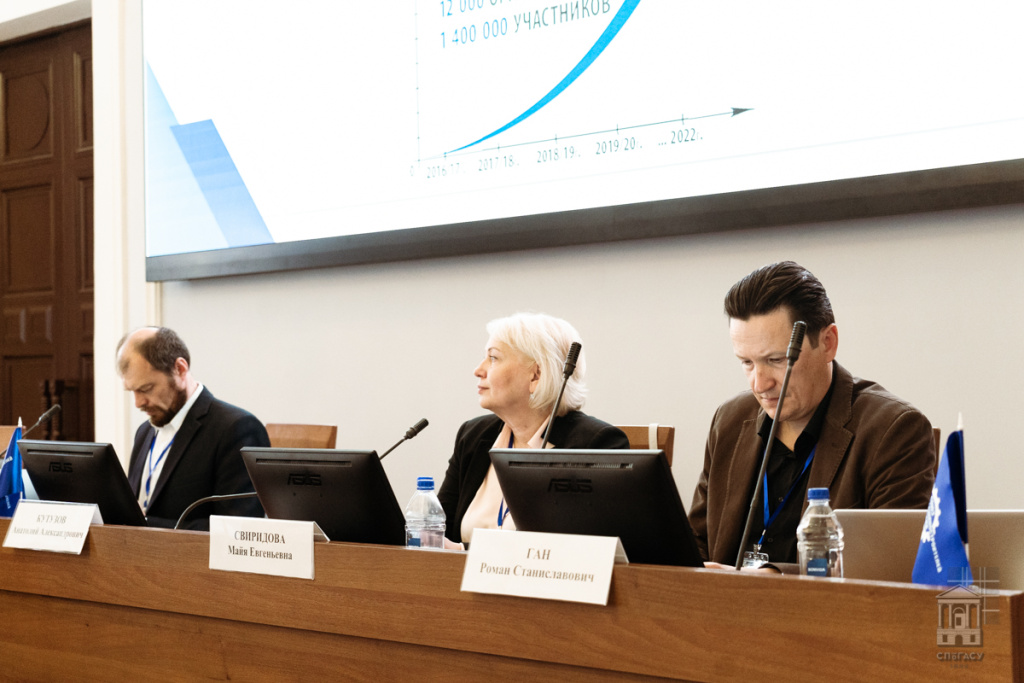
Personnel issue
At the section "Development of Russian automobile platforms. Challenges and tasks of the current period" Roman Gan, General Director of Peterform LLC, spoke about the business needs for engineering personnel. The speaker named the main challenges facing the Russian auto industry. Among them are tectonic transformations in the industry, the departure of international automakers, a complete reformatting of the automobile market; disconnection of the Russian Federation from global platforms and developments, the breakdown of international chains; a sharp drop in local production, import of most cars. Low production volumes combined with a weak R&D base lead to Russia's technological dependence now on China, while eastern partners are in no hurry to share knowledge; some automakers are following the path of assembling Chinese models (subsequent localization is expected). And even for these seemingly not very ambitious tasks, the industry does not have enough engineering personnel: 42 percent of industrial enterprises in Russia are experiencing a shortage of engineers. Only every fourth graduate goes to work for industrial enterprises - only 50 thousand per year. From June to October 2022, more than 6,000 Russian engineers went abroad (not counting software developers). Roman Gan called on universities to cooperate with businesses, take into account the interests of businesses when drawing up programs, and increase the number of educational programs combined with internships at enterprises in senior classes.
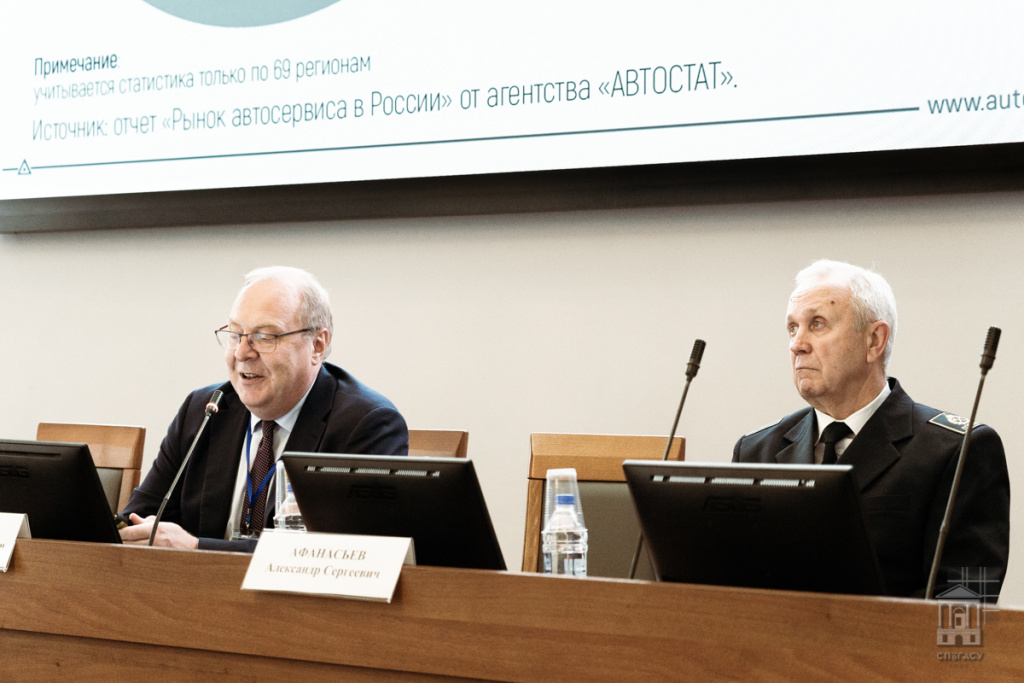 Section "Development of engineering personnel potential in the automotive industry". From left to right: Aleksey Solntsev, Head of the Department of Operation of Automobile Transport and Automotive Service, MADI; Aleksandr Afanasyev, Head of the Department of Transport and Technological Processes and Machines of the Saint Petersburg Mining University
Section "Development of engineering personnel potential in the automotive industry". From left to right: Aleksey Solntsev, Head of the Department of Operation of Automobile Transport and Automotive Service, MADI; Aleksandr Afanasyev, Head of the Department of Transport and Technological Processes and Machines of the Saint Petersburg Mining University A separate section of the conference was devoted to the development of engineering personnel potential in the automotive industry. Representatives of universities shared their experience and developments aimed at improving engineering education. In addition to the reports of MADI representatives, the report of Aleksandr Afanasyev, head of the Department of Transport and Technological Processes and Machines at the Saint Petersburg Mining University, attracted great interest. The report was devoted to the experience of participating in a federal pilot project aimed at changing the levels of professional education. Aleksandr Afanasyev shared the concept of forming the core of higher engineering education, told how this is implemented at the Mining University, how students are provided with the opportunity to obtain working qualifications, how the educational process is structured. Perhaps, if the pilot project is recognized as successful, all engineering universities will switch to this training scheme.
"Overall, the results of the conference can be described as positive. For the SPbGASU Faculty of Automobile and Road Building, this was probably the first experience of organizing such events, in which the main place is occupied not by the scientific agenda, but by the discussion of production issues. It was important for the Faculty to declare itself as one of the centers of automobile and road education in the North-West. And it was quite successful. We have outlined ways to continue cooperation with many conference participants," summarized Igor Chernyaev, head of the SPbGASU Department of Transport Maintenance, member of the organizing committee of the conference.
.jpg)


.jpg)
